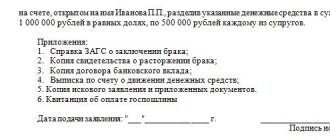During a wedding, everyone is under the influence of some euphoria. Therefore, no one thinks about the seriousness of this step. No one can ever entertain the idea of dividing property or having problems with credit or other obligations. For some reason, it seems to everyone that family is something indestructible, untouchable and eternal. But let’s not exaggerate everything, it’s just that the one who has information is always stronger than the one who is unfounded. But there is no escape from the law, and everyone needs to know what the responsibility of spouses for obligations should be.
If we divide the spouses' responsibilities for obligations briefly, it will look like this:
• internal and external obligations;
• personal and general debts;
• penalties on general and personal property
The table will be able to reveal all the spouses’ responsibilities for obligations in more detail.
| Liabilities | internal | alimony debt |
| responsibilities to children from previous marriages or other relatives | ||
| external | before third parties under contracts of civil law and labor relations | |
| Debts | personal | Before the date of legal marriage. |
| After marriage, but to satisfy the purely personal needs of either spouse. | ||
| The debt of the testator is the debt passed by inheritance to one of the spouses. | ||
| Due to damage caused by one of the spouses to third parties. | ||
| Obligations for alimony in relation to children from a previous marriage, in relation to other persons. | ||
| are common | Loan agreement, loan agreement, purchase and sale agreement of housing, land, lease agreement. | |
| Debt jointly caused by spouses to third parties (Article 1080 of the Civil Code) | ||
| Collections | For common property | Execution is applied to common property without exception if the culprit of the obligation is their minor children (whose age does not exceed fourteen years.) |
| Compensation for damages for the common obligations of the spouses is applied to the common property; if the common property is not sufficient to pay off the debt, the creditor has the right to legally demand recovery from the personal property of both spouses. | ||
| For personal property | Foreclosure of the property of spouses for personal obligations is applied only to the arrest of this spouse (debtor). It is possible that by court decision all property may be seized. |
Composition of the spouses' property. Common property
• The law recognizes as common property precious stones, as well as other luxury items purchased during the period of marriage with common funds, although they are things for individual use.
• The definition of community property is not affected by how the property was acquired: for cash or credit, with the participation of both spouses or only one.
• Formal consolidation of property rights also does not matter, since property purchased during married life and for common income, notarized in the name of one of the spouses, is also considered common.
• The law states that common property includes both monetary winnings and monetary and material winnings if the lottery ticket was purchased during the course of marital life, regardless of who purchased it.
• Income of a married couple from business activities.
• From work activity.
• From intellectual activity.
• Purchased with jointly earned money: living space, land plots and vehicles.
• Any other property acquired during marital life.
What is considered joint property?
Marriage presupposes that the spouses plan to run a joint household. Accordingly, it is assumed that the property becomes joint (Article 33 of the RF IC). Unless otherwise established by a marriage contract or a court decision, the objects are considered to belong to the husband and wife in equal shares.
It is important to remember that joint property includes property acquired during marriage (clause 1 of Article 34 of the RF IC). Anything previously purchased will be considered personal. Also, what was acquired through gratuitous transactions (for example, as a gift) will be considered personal property.
Jointly acquired property will also include the following types of income listed in paragraph 2 of Article 34 of the RF IC:
- wage;
- income from business activities;
- profit from intellectual activity;
- pensions, benefits and other government payments, with the exception of those that have a special social purpose;
- cash deposits, shares and deposits;
- acquired movable and immovable objects.
At the same time, it does not matter to whom exactly such objects are registered; they will be considered the joint property of both spouses. Such jointly acquired property belongs to them in equal shares, with the exception of cases where the marriage contract establishes a different distribution order.
Link to document: “Family Code of the Russian Federation” dated December 29, 1995 No. 223-FZ
Composition of the spouses' property. Personal property
This is all the property that was acquired before the marriage. Also, if, during cohabitation, one of the spouses sells an item from personal property and uses these funds to buy another item, movable or immovable property, then the acquired item also remains personal property.
The above list of common and personal property is not exhaustive, but it is already possible to generally imagine the approximate composition of the property of the spouses.
Does the borrower need the consent of the spouse to assume obligations?
No. Some credit institutions require such consent for a large loan amount, but the law does not provide for such a requirement. The existing presumption of the consent of the spouse to all actions of the second spouse with common property does not apply to the assumption of obligations - this is evidenced by the review of judicial practice of the Supreme Court of the Russian Federation No. 1 (2016).
In connection with the above, the creditors’ arguments that the second spouse should have known about the loan and his consent to such a transaction is implied are untenable.
Debt obligations
There are such obligations: general and personal. Personal obligations are those that arise:
• before the date of legal marriage;
• after marriage, but to satisfy the purely personal needs of either spouse;
• debt of the testator, that is, the debt was inherited by one of the spouses;
• due to damage caused by one of the spouses to third parties;
• alimony obligations in relation to children from a previous marriage, in relation to other persons;
General obligations are those that arose by mutual decision of both spouses to meet the needs of the entire family. This includes:
• loan agreement, loan agreements, purchase and sale agreement for housing, land, lease agreement;
• debt jointly caused by spouses to third parties (Article 1080 of the Civil Code).
So, in the event of problems arising, the responsibility of the spouses for obligations, for personal and general debts, in order to determine the debtor, it is initially necessary to find out when the debt arose (before registering the marriage or after), the purpose of the funds received (to meet the general needs of the family, or personally for one of the objects is married).
Foreclosing on property of spouses
Liability of spouses for obligations, foreclosure of property of spouses for personal obligations, applies only to the arrest of this spouse (debtor). It is possible that, by court decision, all property may be seized. But if it is subsequently proven that this property belongs to the other spouse, then, at the request of this spouse, the judge may fully or partially release the property from seizure. If the defendant (debtor) does not have enough of his own property to repay the debt, then everything is transferred to the responsibility of the spouses for the obligations. In this case, the court can force the spouses to divide property (voluntarily or in court). If during the marriage the spouses drew up a marriage contract, then the property is divided according to it, and the arrest is applied to part of the property of one of the spouses.
It is also necessary to pay attention to the fact that during the trial for personal obligations, foreclosure can be made on common property if it is proven that this property was acquired or increased with money obtained by one of the spouses illegally. The fact that a crime has been committed must be proven in court.
Compensation for damages for the common obligations of the spouses is applied to the common property if personal property is not sufficient to pay off the debt. The creditor has the right to legally demand recovery from the personal property of both spouses.
Comments on Article 45 of the RF IC, judicial practice of application
If one of the spouses enters into a loan agreement, such debt can be recognized as common only if the funds are spent on the needs of the family. Burden of proof
The Review of Judicial Practice of the Supreme Court of the Russian Federation No. 1 (2016) contains the following conclusion:
“If one of the spouses concludes a loan agreement or makes another transaction related to the emergence of a debt, such a debt can be recognized as common only in the presence of circumstances arising from clause 2 of Art. 45 of the RF IC, the burden of proof lies on the party claiming to distribute the debt.”
For more details on the circumstances of the case and the motivation for this conclusion, see the attachment to these comments.
Clause 39 of the Resolution of the Plenum of the Supreme Arbitration Court of the Russian Federation dated July 12, 2012 N 42 “On some issues of resolving disputes related to guarantees” contains the following explanations:
Foreclosing on the property of a spouse under a surety agreement concluded without the consent of the second spouse
When considering the validity of a guarantee agreement concluded by an individual entrepreneur without the consent of the spouse, the courts must proceed from the following. According to paragraph 3 of Article 256 of the Civil Code of the Russian Federation, paragraph 1 of Article 45 of the Family Code of the Russian Federation, for the obligations of one of the spouses, recovery can only be made on the property of this spouse. If this property is insufficient, the creditor has the right to demand the allocation of the debtor's share, which would be due to him in the division of the common property of the spouses, in order to foreclose on it. In connection with the above, the conclusion of a guarantee agreement by an individual entrepreneur without the consent of the spouse does not violate the rights of the guarantor’s spouse and therefore is not a basis for recognizing the guarantee as an invalid transaction.
Clause 6 of the Resolution of the Plenum of the Supreme Court of the Russian Federation dated December 25, 2018 N 48 “On some issues related to the peculiarities of the formation and distribution of the bankruptcy estate in cases of bankruptcy of citizens” contains the following explanations:
Bankruptcy of a citizen: procedure for repaying creditors' claims from the value of the debtor's property and the value of the spouses' common property
In a bankruptcy case of a citizen, both the claims of creditors for the personal obligations of the debtor himself and the claims for the general obligations of the spouses are taken into account. Repayment of these claims at the expense of the bankruptcy estate is carried out in the following order. First, the claims of all creditors, including creditors for current obligations, are repaid from the value of the debtor’s personal property and the value of the spouses’ common property attributable to the debtor’s share. Then the funds attributable to the debtor’s spouse are directed to satisfy the claims of creditors for general obligations (in the outstanding part), and the remaining funds attributable to the debtor’s spouse are transferred to this spouse (clauses 1 and 2 of Article 45 of the Family Code of the Russian Federation (hereinafter - RF IC).
The issue of recognizing an obligation as a general one is resolved by the arbitration court in a bankruptcy case at the request of the creditor when establishing his claim (clause 2 of Article 213.8, clause 4 of Article 213.19, clause 4 of Article 213.24 of the Bankruptcy Law). The spouse of the debtor, who has the rights of a defendant, is involved in such a separate dispute. If a creditor, when making a claim in a bankruptcy case, did not refer to the existence of a common obligation of the spouses, as a result of which the arbitration court established the claim as personal, then such a creditor subsequently has the right to apply for recognition of his claim as a common obligation of the spouses; the corresponding application is subject to resolution according to the rules of paragraph 1 of Article 60 of the Bankruptcy Law with the participation of the debtor’s spouse.
According to paragraph two of paragraph 2 of Article 323 of the Civil Code of the Russian Federation, joint and several debtors remain obligated until the obligation is fully fulfilled. Therefore, the mere distribution of the common debts of the spouses between them in accordance with the provisions of paragraph 3 of Article 39 of the RF IC, made without the consent of the creditor, does not change the joint obligation of the spouses to such creditor to repay the common debt. This norm of the RF IC regulates the internal relationships of spouses without affecting the property sphere of the creditor. So, in particular, spouses must conscientiously fulfill their obligations to creditors in accordance with the terms of the distribution of common debts (clause 3 of Article 1 of the Civil Code of the Russian Federation). In case of violation of this obligation, the creditor has the right to demand fulfillment of the obligation without taking into account the distribution of total debts that has occurred; in this case, a spouse who has fulfilled a joint and several obligation in an amount exceeding his share, determined in accordance with the terms of distribution of common debts, has the right of recourse against the other spouse within the limits of what was fulfilled minus the share falling on himself (subparagraph 1 of paragraph 2 of Article 325 of the Civil Code of the Russian Federation ).
In paragraphs 18, 19 of the Resolution of the Plenum of the Supreme Arbitration Court of the Russian Federation dated June 30, 2011 N 51 “On the consideration of bankruptcy cases of individual entrepreneurs” the following explanations are given:
Foreclosing on the property of a spouse in the event of bankruptcy of an individual entrepreneur
If the debtor - an individual entrepreneur - is or was married, the courts must proceed from the following.
Property acquired by spouses during marriage is their joint property (clause 1 of Article 34 of the Family Code of the Russian Federation; hereinafter referred to as the RF IC). The property of the spouses is common, regardless of which particular spouse it was acquired, registered or accounted for (clause 2 of Article 34 of the RF IC).
In accordance with paragraph 1 of Article 45 of the RF IC, for the obligations of one of the spouses, recovery can only be made on the property of this spouse. If there is insufficient property, the creditor has the right to demand the allocation of the share of the debtor spouse, which would be due to the debtor spouse during the division of the common property of the spouses, in order to foreclose on it.
Thus, the joint property of the spouses cannot be included in the bankruptcy estate. In order to form a bankruptcy estate, the bankruptcy trustee, in the interests of all creditors, may apply to the court with a demand for the division of the common property of the spouses (clause 3 of Article 256 of the Civil Code of the Russian Federation, clause 1 of Article 45 of the RF IC). This requirement is considered in court according to the general rules of jurisdiction.
However, if movable things are in the possession of the debtor, either he is listed as the sole owner of the property right (right of claim, exclusive right, share in the authorized capital of a limited liability company, uncertificated securities, etc.), or in the Unified State Register of Rights to Real Estate and transactions with him reflect that the real estate registered in the name of the debtor is his property, the bankruptcy trustee has the right to assume that the property belongs to the debtor and include it in the bankruptcy estate. In this case, the other spouse, who does not agree with the actions of the bankruptcy trustee, has the right, in the general manner, to apply to the court with a claim for the division of the common property of the spouses and the allocation of property due to the share of this spouse, or to demand recognition of the right of common ownership of the specified property.
If a spouse's claim for division of common property is considered after the sale of property during bankruptcy proceedings, the proceeds from the sale of property are taken into account when determining the shares of the spouses.
Property due to the debtor as a result of the division of the common property of the spouses is subject to inclusion in the bankruptcy estate
If, as a result of the division of property in kind, one of the spouses must pay compensation to the other in cash, the courts must be guided by the following. If a payment to the bankruptcy estate must be made by the debtor's spouse, then the bankruptcy trustee does not transfer to him the property due to the said spouse as a result of the division until the corresponding amount of money is received by the bankruptcy estate (in relation to Article 359 of the Civil Code of the Russian Federation). If the payment is not made within the period determined by the court considering the bankruptcy case, the bankruptcy trustee has the right to sell the specified property according to the rules established for the sale of property encumbered with a pledge (Article 138 of the Bankruptcy Law), on the basis of Article 360 of the Civil Code of the Russian Federation. (Clause 19 of the Resolution of the Plenum of the Supreme Arbitration Court of the Russian Federation dated June 30, 2011 N 51)
Responsibility of spouses for obligations. Family law
If we move a little away from the topic of penalties to the topic of children, then sometimes we can end up back where we came from. Dear parents, keep in mind that if your child, when asked how things are, always says that it’s good, this does not mean anything. Take the time to ask your friends, teachers, and neighbors who your child is friends with, just hangs out with, and whether he has been seen by chance with people an order of magnitude older than himself. Children sometimes do not very reasonable things against their own will, and even more so in adolescence. This all comes from the desire to “show off” in front of older friends, in front of girls or boys, or simply to appear older. So don’t be afraid to ask your child again where he is and double-check. Let it look like betrayal or distrust on the part of the parents towards the child, but this way you can prevent or avoid unpleasant situations that your offspring may find themselves in.
Responsibility of spouses
Keep in mind, fathers and mothers, according to the law, both parents are equally responsible for the child’s actions. This is also the partial responsibility of the spouses for the obligations. Its main section is Family Law. Execution is applied to common property without exception, if the culprit of the obligation is their minor children (whose age does not exceed fourteen years). Teenagers between the ages of fourteen and eighteen must bear financial responsibility themselves for causing harm to others. In this case, parents are financially involved only when the defendant (a minor from 14 to 18 years old) does not have enough funds to pay off the debt, or the defendant does not have property that can be foreclosed on.
What objects cannot be foreclosed on?
Article 446 of the Code of Civil Procedure of the Russian Federation contains a list of objects on which foreclosure cannot be applied under any circumstances:
- housing that is the only suitable place for residence for the debtor and his family members;
- facilities necessary to provide minimal household needs;
- objects used to earn money;
- items that are necessary to ensure the life of a disabled person, for example, a wheelchair;
- seeds needed for the next sowing;
- fuel used for space heating and cooking;
- products and things within the subsistence level;
- livestock, provided that it is used for personal use and not for the purpose of conducting business;
- personal prizes and awards.
Of such objects, the share of each individual spouse cannot be allocated; they are generally inviolable, even if this contradicts the interests of the creditor.
Download for viewing and printing: Article 446 of the Code of Civil Procedure of the Russian Federation “Property that cannot be foreclosed on under executive documents”
Responsibility of spouses for obligations
When concluding a marriage contract, everything is negotiated and described point by point in a notarial manner. Spouses are required to notify all creditors of changes to the prenuptial agreement. If the spouses do not wish to notify of all changes in general, then their responsibility involves submitting a report to creditors for consideration. If the creditor was not notified of the change in the marriage contract, then such a contract is invalid for the creditor, and in court proceedings the previous contract will be legal, or the terms of such a contract will not be taken into account at all.
For example, if the marriage contract was changed, the terms of which say about the distribution of debts. In the previous agreement they were general, but under the new agreement they became personal to one of the spouses. In this case, the creditor has every right to foreclose on the common property. In this case, the liability of the spouses is full, since this change is invalid for the creditor. But after repaying the debts from the property acquired during the marriage, one of the spouses, who under the new marriage contract is the only defendant, is obliged to compensate the other for that part of the debt that the creditor compensated at his expense.
No big words are needed to sum it up. Just be careful when you sign any documents, read them, if you don’t understand something, consult a lawyer, don’t make hasty conclusions under the influence of someone’s promises, beautiful stories, and so on. Moreover, do not do rash actions. After all, ignorance of the law does not exempt you or your children from responsibility. Be carefull.
Legal status of property and debt obligations of spouses according to the Family Code
In accordance with Art. 34 of the RF IC, all property acquired by spouses during marriage is recognized as joint property (unless otherwise specified in the marriage contract).
This means that debts taken during the marriage can also be recognized as common, and their return is carried out according to the shares that were awarded during the division.
Example from practice. The Ivanovs took out a loan of 400,000 rubles to renovate their house/apartment. Then they divorced and divided their property. 50% went to Ivanova, 50% went to Ivanov. They also “distributed” the debt taken out from the bank. Those. The wife must give 200,000, and the husband must give 200,000.
This is a conditional situation, since the shares during division may be different. But an example is given so that you understand how Art works. 34 RF IC.
What happens if your ex-husband has accumulated debts and does not pay them back, and you are afraid of calls from collectors?
From the moment of divorce, you legally become “strangers”. All loans taken by the “ex” are on his conscience. You don't need to return anything.










